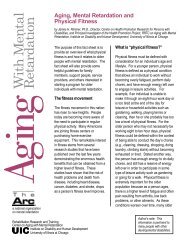Bridging the Aging and Developmental Disabilities Service ... - rrtcadd
Bridging the Aging and Developmental Disabilities Service ... - rrtcadd
Bridging the Aging and Developmental Disabilities Service ... - rrtcadd
Create successful ePaper yourself
Turn your PDF publications into a flip-book with our unique Google optimized e-Paper software.
success in controlling health care costs led states such as Minnesota, Wisconsin, <strong>and</strong> Colorado to<br />
begin including long-term services <strong>and</strong> supports in <strong>the</strong>ir managed care programs. States have<br />
included segments of <strong>the</strong> Medicaid beneficiaries in managed health care to care for older persons<br />
<strong>and</strong> people with developmental disabilities. In contrast, fewer states have been moving people<br />
with developmental disabilities into Medicaid long-term care programs due to strong opposition<br />
from disability advocates, DD professionals, <strong>and</strong> some providers, especially nursing homes, who<br />
view managed care as an economic threat.<br />
SUMMARY OF KEY ISSUES<br />
The major reforms in health <strong>and</strong> long term supports nationally highlight <strong>the</strong> gaps <strong>and</strong> challenges<br />
in addressing both <strong>the</strong> populations who age into disability <strong>and</strong> those who age with disabilities.<br />
Both of <strong>the</strong>se populations have similar needs for supports that are community based, personcentered,<br />
<strong>and</strong> coordinated with <strong>the</strong>ir health care needs. Yet, unique needs exist for individuals<br />
with developmental disabilities who require life-long supports. Also <strong>the</strong>re are differences in <strong>the</strong><br />
structure <strong>and</strong> philosophies of <strong>the</strong> aging <strong>and</strong> DD networks. Previous efforts to bridge <strong>the</strong> two<br />
systems have had mixed results <strong>and</strong> provide insights into fostering future collaborations. The<br />
recent ADRC initiative offers us as example of <strong>the</strong> challenges in working across systems.<br />
The following are key findings of this project:<br />
People aging with developmental disabilities <strong>and</strong> <strong>the</strong>ir families have unmet<br />
needs for health <strong>and</strong> long-term supports that will continue to grow as <strong>the</strong><br />
population ages.<br />
• People with developmental disabilities consumed 72% of 2006 Medicaid waiver<br />
expenditures although <strong>the</strong>y accounted for only 40% of Waiver enrollees. They need<br />
lifelong services <strong>and</strong> many individuals have extensive support needs. The 2008 average<br />
expenditure per person was $42,896 for developmental disabilities, $9,510 for aged <strong>and</strong><br />
$18,043 for physically disabled Medicaid 1915(c) Waiver funded HCBS. 36<br />
• People with developmental disabilities experience long waiting lists for services. In 2010,<br />
268,220 people were on state wait lists for Medicaid 1915 (c ) HCBS DD waivers which<br />
is double <strong>the</strong> combined wait list size for elderly adults <strong>and</strong> people with physical<br />
disabilities, <strong>and</strong> <strong>the</strong>ir average waiting period for a waiver slot to open was three times as<br />
long. The average waiting time to receive DD waiver serves is 36 months compared to 9-<br />
13 months for <strong>the</strong> aged <strong>and</strong> disabled waivers. 36<br />
• Approximately 1.36 million adults with developmental disabilities live independently or<br />
with a spouse. Most probably do not receive DD services <strong>and</strong> after age 60, are likely to<br />
be referred to <strong>the</strong> aging network for any needed supports <strong>and</strong> services. Emerging<br />
<strong>Bridging</strong> <strong>the</strong> <strong>Aging</strong> <strong>and</strong> <strong>Developmental</strong> <strong>Disabilities</strong> <strong>Service</strong> Networks Page 40



